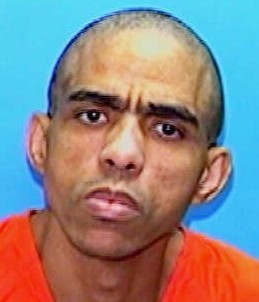|
DC# 286020
DOB: 08/23/66
Fourth Judicial Circuit, Duval
County, Case #88-11507
Sentencing Judge: The Honorable
L. Page Haddock
Attorneys, Trial: Alan
Chipperfield & William White - Assistant Public Defenders
Attorney, Direct Appeal: David
A. Davis - Assistant Public Defender
Attorney, Collateral Appeal:
Frank J. Tassone, Jr., Esq. – Registry
Date of Offense: 02/18/88
Date of Sentence: 09/15/89
Circumstances of Offense:
On the morning of 02/18/88,
Glenda Jurado was returning home from jogging when Tony Watts forced her
at gunpoint towards her house.
Watts informed Glenda that he was just
released from prison and needed money to leave town. Simon Jurado,
Glenda’s husband, answered the door, at which time she told her husband
that Watts had a gun and was demanding money.
Simon gave Watts all the
money he had, but Watts demanded more and stated that he would kill
Glenda if he didn’t get it. In response to his threats, Simon gave
Watts a piggy bank containing money.
After searching the house Watts
made Simon undress in the bathroom and told Glenda to get undressed as
well. Watts penetrated Glenda with his finger and unsuccessfully
attempted to have sexual intercourse with her.
Upon seeing what Watts
was doing to his wife Simon yelled and threw a chair at him. The chair
knocked Watts into the hallway. Glenda ran from the house while the two
men struggled. Glenda heard a shot fired and her husband scream.
She
also witnessed Watts run out of the house and down the street with the
gun. Simon ran out of the house but collapsed on the lawn and died.
The cause of death was from the gunshot wound to Simon’s mouth, which
severed an artery leading to his brain.
In September 1988, Glenda and a
neighbor who witnessed Watts running from the house that day identified
him as being the assailant. Watts’ baseball cap, which was found inside
the Jurado’s house, contained hairs microscopically similar to his. His
fingerprints were also found on the door of the front porch.
*****
Trial Summary:
09/29/88 The defendant
was indicted on the following charges:
Count I: First-Degree
Murder
Count II: Armed Burglary
With an Assault
Count III: Armed Robbery
Count IV: Armed Sexual Battery
Later reduced to Sexual
Battery Using Physical Force
08/03/89 The jury found the defendant guilty
of all counts charged in the indictment.
08/17/89 Upon advisory sentencing, the jury,
by a 7 to 5 majority, voted for the imposition of a death sentence.
09/15/89 The defendant
was sentenced as followed:
Count I: First-Degree
Murder - Death
Count II: Armed Burglary
With an Assault - Life
Count III: Armed Robbery -
Life
Count IV: Sexual Battery
Using Physical Force - 30 Years
*****
Case Information:
On 09/26/89, Watts filed a
Direct Appeal in the Florida Supreme Court. Watts claimed that the
trial court was required by section 916.11(1)(d) Florida Statutes (1987)
to appoint the Department of Health and Rehabilitative Services (HRS)
diagnosis and evaluation team for the evaluation of his mental
competence and competence level to stand trial. The Florida Supreme
Court found that the trial court did abuse its discretion; however,
Watts’ attorney neglected to preserve the issue for appeal. Watts also
claimed that the trial court erred in finding that he was competent to
stand trial. The defendant raised this claim because of conflicting
expert testimony regarding this issue. In his third claim, Watts
contended that the trial court did not advise him that he had the right
to represent himself and failed to conduct a Faretta
inquiry when he requested another attorney. Additionally, Watts claimed
the court should have granted a mistrial because of prosecutorial
misconduct. The statements made by the prosecutor during closing
arguments were found to have had no effect on the verdict. In reference
to the penalty phase, Watts claimed that the trial court erred in
considering his crime to have been especially heinous, atrocious or
cruel. The Florida Supreme Court agreed that this crime was not
especially heinous, atrocious or cruel but found the error to be
harmless. Watts next argued that executing a mentally retarded person
was cruel and unusual punishment. The Florida Supreme Court found that
even if it were cruel and unusual to execute the mentally retarded,
Watts was found to be competent.
The Florida Supreme Court affirmed
Watts’ convictions and sentence of death on 01/02/92.
On 04/15/92 Watts filed a
Petition for Writ of Certiorari in the United States Supreme Court,
which was denied on 06/22/92.
On 09/16/93 Watts filed a 3.850
Motion that is still pending in the Circuit Court. On 05/04/99, Watts
was determined to be incompetent to proceed with his postconviction
relief and was committed to the Florida State Mental Hospital.
Competency reevaluations are scheduled every 90 days.
FloridaCapitalCases.state.fl.us
|

